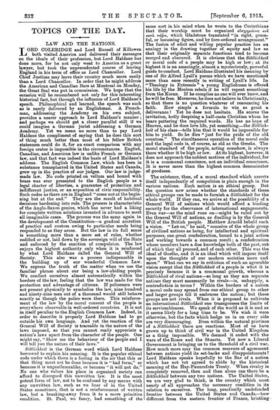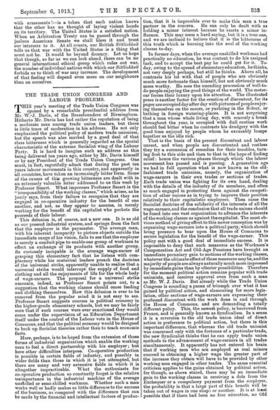TOPICS OF THE DAY.
LAW AND THE NATIONS.
TAORD COLERIDGE and Lord Russell of Killowen both visited America and delivered their messages on the ideals of their profession, but Lord Haldane has done more, for he not only went to America as a great lawyer, but took the unprecedented course of leaving England in his term of office as Lord Chancellor. Lord Chief Justices may leave their country much more easily than a Lord Chancellor. In order that he might address the American and Canadian Bars at Montreal on Monday, the Great Seal was put in commission. We hope that the occasion will be remembered not only for this interesting historical fact, but through the influence of Lord Haldane's speech. Philosophical and learned, the speech was such as is rarely delivered by an Englishman. A French- man, addressing the Academy on his own subject, provides a nearer approach to Lord Haldane's manner ; and perhaps we should get a closer parallel still if we could imagine a German jurist addressing a German Academy. Yet we mean no more than to pay Lord Haldane the compliment of saying that he does this sort of thing much better than most of his fellow British statesmen could do it, for an exact comparison with any foreign orator is impossible in the circumstances. English, Canadian, and American law is unlike French or German law, and that fact was indeed the basis of Lord Haldane's address. The English Common Law, which has been in substance transplanted in the United States and Canada, grew up in the practice of our judges. Our law is judge- made law. No code printed on vellum and bound with brass was ever presented to the English people as a legal charter of liberties, a guarantee of protection and indifferent justice, or an exposition of civic responsibility. Such codes as there are in England " come not at the begin- ning but at the end." They are the result of habitual decisions hardening into rule. The process is characteristic of the Anglo-Saxon genius, which has never had a liking for complete written solutions invented in advance to meet all imaginable cases. The process was the same again in the development of the Constitution—a gradual accretion of practice and custom owing to particular needs being responded to as they arose. But the law in its full sense is something more than a mere set of rules, whether codified or not, laid down by the sovereign will of the State and enforced by the sanction of compulsion. The law enjoys the highest authority only when it is reinforced by what Lord Haldane called the General Will of Society. This also was a process indispensable in the building up of our wonderful Common Law. We express the truth of the matter when we use the familiar phrase about our being a law-abiding people. We conduct ourselves almost automatically within the borders of the law, feeling that the law was made for the protection and advantage of citizens. If policemen were not present physically to symbolize the law, nine hundred and ninety-nine men out of a thousand would still behave exactly as though the police were there. This reinforce- ment of the law by the moral consent of the people is everywhere observable in well-ordered countries. It is not in itself peculiar to the English Common Law. Indeed, in order to describe it properly Lord Haldane had to go outside his own language. And yet the reaction of the General Will of Society is traceable in the nature of the laws imposed, so that you cannot really appreciate a nation's laws apart from the character of the people. One might say, " Show me the behaviour of the people and I will tell you the nature of their laws."
Sittlichkeit is the German word which Lord Haldane borrowed to explain his meaning. It is the popular ethical code under which there is a feeling in the air that this or that thing must not be done because it is " bad form," or because it is ungentlemanlike, or because " it will not do." No one who values his place in organized society can afford to disregard this unwritten law. It is the most potent form of law, not to be confused by any means with any unwritten law, such as we bear of in the United States sometimes, that is not a reinforcement of written law, but a breaking-away from it to a more primitive condition. St. Paul, we fancy, had something of the same sort in his mind when he wrote to the Corinthians that their worship most be organized? e2crxekuhan Kul Kara ratcv, which Gladstone translated "in right, grace- ful, or becoming figure, and by fore-ordered arrangement." The fusion of edict and willing popular practice has an analogy in the drawing together of equity and law so that their originally separate functions tend to become merged and obscured. It is obvious that the Sittlichkeit or moral code of a people may be high or low ; at its highest it is an amazingly, almost a mysteriously, powerful guide to conduct. Lord Haldane illustrated his meaning by one of Sir Alfred Lyall's poems which we have mentioned more than once recently in writing of Lyall's life. In " Theology in Extremis " a young Englishman is offered his life by the Moslem rebels if he will repeat something from the Koran. If he complies no one will ever know, and he will be free. Moreover, he does not believe in Christianity, so that there is no question whatever of renouncing his faith. How simple a formula to win so great a. deliverance ! Yet he does not hesitate. He scorns the invitation, hotly despising a half-caste Christian whom he hears pattering the required words. He has no hope of Heaven, and he does love life, yet something—the Sittlich- keit of his class—tells him that it would be impossible for him to yield. So he dies "just for the pride of the old countree." The simultaneous operation of the moral code and the legal code is, of course, as old as the Greeks. The moral standard of the people, acting somehow, is always there whether it be high or low. At its highest, however, it does not approach the noblest motives of the individual, for it is a communal conscience, not an individual conscience. It is never more than the highest common denominator of goodness.
The existence, then, of a moral standard. which asserts itself independently of compulsion is plain enough in the various nations. Each nation is an ethical group. But the question now arises whether the standards of these ethical groups can be made to furnish a Sittlichkeit for the whole world. If they can, we arrive at the possibility of a. General Will of nations which would afford a binding security for the observance of international engagements. Even war—so the mind runs on—might be ruled out by the General Will of nations, as duelling is by the General. Will of the British people. Matthew Arnold beheld such a vision. " Lebus," he said, " conceive of the whole group of civilized nations as being, for intellectual and spiritual purposes, one great confederation, bound to a joint action and working towards a common result ; a confederation whose members have a due knowledge both of the past, out of which they all proceed, and of each other. This was the ideal of Goethe, and it is an ideal which will impose itself upon the thoughts of our modern societies more and more." What can we say in criticism of such an agreeable vision except that the Sittlichkeit of a people is what it is precisely because it is a communal growth, whereas a. Sittlichkeit of rival nations—so long as they are separate nations they must necessarily be rivals—is, unhappily, a contradiction in terms ? Within the borders of a nation a moral code may spread from one ethical group to other and larger groups till it embraces the nation ; but these groups are not rivals. When it is proposed to cultivate an international Sittlichkeit one transgresses the limits of its serviceableness. We speak of the world as it is and as it seems likely for a long time to be. We wish it were otherwise, but the facts which hedge us in on every side are very discouraging. Even within the natural province of a Sittlichkeit there are reactions. Most of us have grown up to think of civil war in the United Kingdom as a thing impossible. We deemed it ended with the wars of the Roses and the Stuarts. Yet now a Liberal Government is bringing us to the threshold of a civil war. How much more may the common measure of agreement between nations yield its set-backs and disappointments ! Lord Haldane speaks hopefully to the Bar of a nation which has not yet agreed to abide by the historical meaning of the Hay-Pauncefote Treaty. When rivalry is completely removed, then and then alone can there be a Sittlichkeit between any two nations. The United States, we are very glad to think, is the country which most nearly of all approaches the necessary condition in its relation to ourselves. The long, practically undefended frontier between the United States and Canada—how different from the eastern• frontier of France, bristling • with armaments !--is a token that each nation knows that the other has no thought of laying violent hands on its territory. The United States is a satisfied nation. When an Arbitration Treaty can be passed through the jealous American Senate we shall bless it and trust our interests to it. At all events, our British Sittlichkeit tells us that war with the United States is a thing that must not be. It would be beyond decency. Let us hope that though, so far as we can look ahead, there can be no general international ethical group which rules out war, the number of individual nations with which our Sittlichkeit forbids us to think of war may increase. The development of that feeling will depend even more on our neighbours than on ourselves.







































 Previous page
Previous page